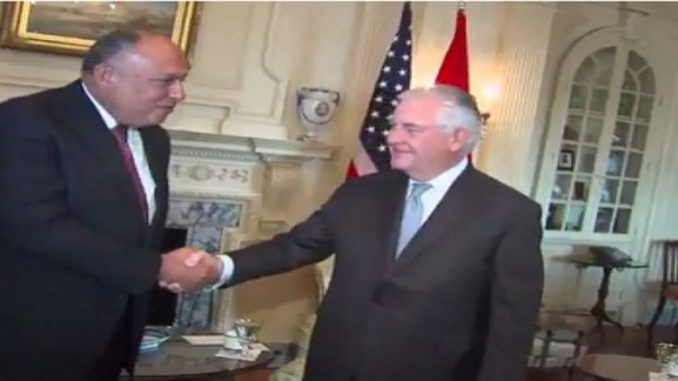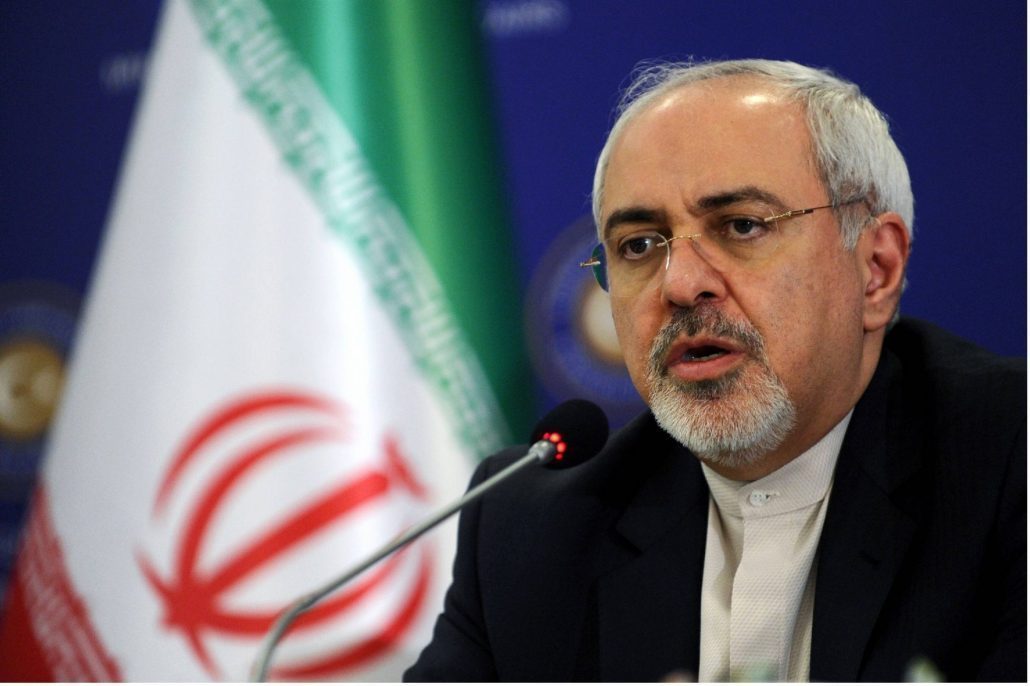
Recent activities have been tracked between the United States and Egypt toward warmer relations with Al-Sisi’s regime.
During his visit to Egypt on Sunday and shortly after he met with Abdel Fattah al-Sisi and top Egyptian military officials, Gen. Joseph L. Votel, the head of the United States Central Command said that the United States wanted to resume a major military exercise with Egypt that President Barack Obama canceled in 2013 to protest the killings of hundreds of civilian protesters (Hundreds, some say thousands, were killed in Raba’a and Nahda squares, as well as Egyptian streets, at the hands of army and security forces following the military coup that was led in 2013 by Abdel-Fattah Al-Sisi, the defense minister at the time, against Egypt’s first democratically elected president, Mohamed Morsi).
He also said, “It is my goal to get that exercise back on track and try to re-establish that as another key part of our military relationship.”
It is worth mentioning that the first joint American and Egyptian exercise began in 1980 and then it expanded until it became a major biannual undertaking.
The maneuvers are known by the largest Bright Star exercise, it included about 70,000 troops from 11 nations and was held in 1999.
According to the New York Times, US daily newspaper, “Even if a formal agreement on resuming the exercise is reached soon, it may take 18 months or longer for a new Bright Star to be held because funds need to be included in the Pentagon’s future budget requests.”
US Secretary of State Rex Tillerson promises more aid for Cairo
In the same context, US Secretary of State Rex Tillerson met with his Egyptian counterpart Sameh Shoukry in Washington on Monday.
During the meeting, US Secretary of State promised more aid for Cairo’s counter-terrorism efforts and economic development plan.
He also added that the Washington considers Cairo a real partner in the Middle East, according to state news agency MENA.
Both officials stressed that the special and strategic ties that have binded the two countries for decades, vowing more cooperation on all levels.
Egypt’s Foreign Minister arrived to Washington on Sunday for talks with US officials, which will include meetings with National Security Adviser Raymond McMaster as well as some leading representatives from Congress.
Shoukry updated his US counterpart on the latest economic and security developments in Egypt, as well as the country’s counter-terrorism efforts, as stated by the Egyptian Foreign Ministry spokesman Ahmed Abu Zeid.
Both officials also discussed a range of regional issues, including the Syrian crisis, where Shoukry stressed the importance of reaching a political solution to the conflict in a way that preserves the country’s territorial integrity and national institutions and achieves the hopes of the Syrian people.
FM Shoukry also spoke with Tillerson about Egypt’s political efforts to end the crisis in Libya in accordance with the UN-brokered Skhirat agreement of 2015,
On the Palestinian-Israeli conflict, Shoukry stressed the necessity of establishing a Palestinian state, pointing to Cairo’s efforts to return both sides to the negotiating table.
Moreover, the Egyptian FM will also discuss with US officials preparations for Abdel-Fattah Al-Sisi’s upcoming visit to the US to meet with President Donald Trump, which will be the first meeting between an Egyptian and US president in years.
Al-Sisi, Trump and the War on Terrorism
Moments after his inauguration, the White House announced an immediate policy to unite civilized world “to defeat and destroy ‘terrorism’, which we will eradicate completely from the face of the Earth”.
Trump administration said it would make defeating “radical Islamic terror groups” its top foreign policy goal.
In the statement titled, “America First Foreign Policy”, the Trump administration said, “Defeating ISIS and other radical Islamic terror groups will be our highest priority.”
The new American administration said that in order to “defeat and destroy” ISIS and similar groups, we “will pursue aggressive joint and coalition military operations when necessary”, work to cut off funding for armed groups, expand intelligence sharing, and use “cyber-warfare” to disrupt propaganda and recruitment efforts.
In this context, many observers believe that the new announced US foreign policy infers that US and Egypt would get closer under the new US administration.
In addition to other signs that appeared before Trump won in the US elections when he expressed to al-Sisi “his strong support for Egypt’s war on terrorism, and how under a Trump administration, the United States of America will be a loyal friend, not simply an ally, that Egypt can count on in the days and years ahead, according to Politico magazine.
Trump also said that if elected president, he will work with Sisi to fight terrorism, describing him in a speech as someone who recognizes that “this ideology of death must be extinguished.”
After the meeting, Trump’s team released an account of his meeting with Sisi that was striking in how much praise the Republican heaped on Egypt.
On the other side, when al-Sisi was asked directly about his opinion on the US elections – during an interview with the CNN after meeting with Trump – and the possibility that Trump would make a strong leader, al-Sisi replied by saying “no doubt”.
A-Sisi was one of a few world leaders Trump requested to meet when he was a candidate on the sidelines of the UN General Assembly in September.
Moreover, al-Sisi was among the first World Leader to congratulate Trump to congratulate him on his victory.
In the same context, Sameh Shoukry was the first Arab official to meet US elect official in the new administration which infers how warm will be the relation between both countries.
Accordingly, it is more likely that Donald Trump administration will take steps in favor of the al-Sisi regime as” the both leaders have many views in common.”
It is known that Trump opposes the attempts of change in the region known as “The Arab Spring”, tends to support stability, and is against any radical changes in the region.
In addition, Trump views war on terrorism as a top priority for US foreign policy.
Brookings institution has stated in an article “Trump’s Misdiagnosis of the Jihadists Threats” that Trump policy in the Middle East will differ from former US presidents who had a different diagnosis and thus different treatment.
“Presidents Bush and Obama believed that the lack of good governance and political freedom were the root cause of jihadism, not religion. As a result, Bush and Obama pushed for political reform in the Arab world,”said Brookings.
However, “Trump and his closest national security advisers want unconditional support for Muslim autocrats who have vowed to reform Islam to stop the violence. At the top of the list are Abdel Fatah al-Sisi in Egypt and King Abdullah in Jordan, who have both said religious reform is a necessary prelude to defeating jihadism,” according to Brooking.
In addition, Carnegie Middles East Center mentioned that Trump presidency could signal a “significant shift in American–Egyptian relations,” which have cooled since the 2013 coup.
For example, the United States partially suspended military aid after the military coup in 2013, later it was restored in March 2015, citing a need to combat the Islamic State in Sinai.
According to Carnegie, “However, even though the United States restored aid, Abdel Fattah al-Sisi still has not been invited to the White House, a public snub to a close American ally. Trump, however, seems to have another policy regarding Egypt.”
In September 2016, when Trump met al-Sisi in New York, Trump praised Sisi’s efforts in his war on terror and stated that, if he were elected, the United States would be a friend to Egypt, not simply an ally.
In addition, this was followed by a promise to invite Sisi on an official state visit. In response, al-Sisi was quick to return the praise, stating that” Trump would be a strong president, one of the key points that Trump was using in his electoral platform.”
Carnegie added that this warming of relations can have a number of implications in terms of policy. “First, Trump’s brand of right-wing populism is likely to strengthen Sisi’s position internationally and domestically, since it is likely to create support for his continued repression of the Muslim Brotherhood and the secular opposition under the rubric of the War on Terror.’
In addition, various leaders in the GOP (the Republican party is usually referred to as the Grand Old Party GOP)-including Jeb Bush and Ted Cruz- have praised al-Sisi “signaling the affinity between the Egyptian regime and Republican Party at a time when repression was rampant in Egypt. “
Moreover, the pressure from Washington to reduce levels of repression and allow civil society to operate, which Clinton was expected was to exert, is not expected to be one of Trump’s priority.



